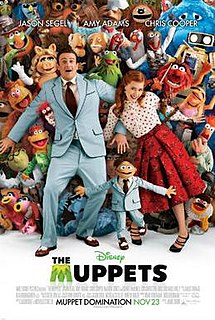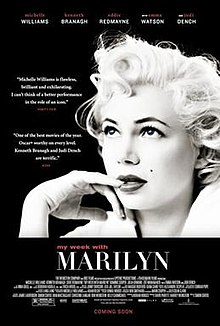Magical may be the only fitting way to describe this Disney triumph. Truly a must-see not only for the nostalgia, but also for the joy you can derive from its simplistic approach to life and laughter, The Muppets has a heart beneath all that layers of felt and fabric.
The Good
- grandly clever and traditionally Muppet nonsense sense
- nostalgia level over 9000
- the amount of laughs in this movie equals its amount of heart
- great music
The Bad
- It's not 4 hours long, for the time they've been gone, we need more
Synopsis
Walter (a born muppet) and his older brother Gary (a human) grew up together in Smalltown. Together, they grew up watching The Muppet Show and Walter dreamt of becoming part of The Muppet Show, while Gary grew up to have a relationship with Mary, a school teacher. On their 10th year anniversary, Mary and Gary are going to Los Angeles to celebrate; Gary adds Walter to the entourage to surprise him with a visit to The Muppets studios. However, what they arrive to in Los Angeles was the condemned Muppet Studios, every attraction closed, every part close to falling apart. Walter wanders inside the abandoned Kermit's office and overhears a plan between Mr. Richman, his henchmen, and Statler and Waldorf to take over the Muppet Studios and turn it into a museum. After Statler and Waldorf have gone, Richman and his gang revealed that they will tear down the Muppet Studios and drill oil, all while laughing maniacally. Walter heard all these and ran out screaming until he got home. Together, he, Gary, and Mary gather the Muppets so they can raise the money and save the studio.
Life's a Happy Song
Like in TV, The Muppets is filled with musical numbers, most of them contribute to the overall humor of the film. Most of the songs are touching or silly or both, and are at times sing-able. In fact, Bret McKenzie's Man or Muppet won the Academy Award for Best Song. As with most comedy musicals, this film is filled with silly dance numbers that adds to the movies light-hearted feel.
The Rainbow Connection
 |
| Bret McKenzie, with Kermit, performs one of the songs he wrote for the Muppet movie via Youtube |
The Rainbow Connection
I was 5 when I discovered The Muppets. Initially, I watched Sesame Street only and slowly graduated to The Muppet Show after watching their Music videos. I kept looking for Big Bird, Ernie and Bert, Oscar, etc. in The Muppet Show. Eventually, I got used to the humor of The Muppets. Then I grew up, the re-runs stop airing, and I forgot them. I forgot how fun they were. So when I found out that they have a movie coming up, I was like, "Meh. Probably boring." It's been more than a decade since the last Muppet movie and at this rate, they were easy to dismiss as has-beens.
As this was shown around December 2011 last year in the United States, I was fortunate enough to get knowledge of this film being a surprise treat. Without nothing much to work on other than it is a "surprise treat," I dove in to discover how true that description is.
Jason Segel and Nicholas Stoller (who Segel worked with in Forgetting Sarah Marshall) co-wrote the Muppet movie, and the result of this cooperation is an extremely fun and rare fourth-wall breaking / absurdly funny movie filled with nostalgia and heart. The extensive use of absurd jokes such as "travel by map," "maniacal laugh," and "that was an expensive-looking explosion, I didn't know we have that in our budget" greatly surprises audiences who think that the Muppets will take itself seriously and come out cheesy. In fact, that was the last thing it did, and these absurd jokes took the movie to a level of light not achievable by real people.
But it's not all about laughs and music, The Muppets have internal conflicts, too, that showcase the heart beneath the fabric. In a way, these conflicts further gave the Muppets character and made them grow. For instance, if before we just knew Kermit as the Muppet leader and the voice of reason and order among the gang, the movie shows him also as reluctant, proud, and regretful--things you would not have known about him if he was trapped inside the TV--in fact, this approach help introduce the Muppets to a wider audience who don't have knowledge of them. Their struggle to put up a telethon with very little progress or interest from the current world (and a realization that they are has beens) shows a conflict that is, albeit light, crucial, rending, and engaging. The telethon itself is a clever depiction of a returning audience's reaction to the movie. Initially, a moviegoer may start doubtful and faithless that the movie will be good, just like the telethon where initially only hobos were watching, but as the movie progresses, you would be completely absorbed and rooting that The Muppets succeed, just like the entertained audiences in the telethon who came in flocks, eventually.
The movie's nostalgic scenes (such as the Muppets' opening sequence) and the Mahna Mahna number bring back so much memories that may be enough to make you forget that you are a grown man and cry your eyes out, and with its proper pacing, the moviegoers are guided very well, whether they are new to the Muppets or are age-old fans.
In the end, it's hard to describe exactly what happened in the Muppets. All I know is that it's nothing short of magic.
As this was shown around December 2011 last year in the United States, I was fortunate enough to get knowledge of this film being a surprise treat. Without nothing much to work on other than it is a "surprise treat," I dove in to discover how true that description is.
 |
| How I Met Your Mother star, Jason Segel, co-wrote The Muppets |
But it's not all about laughs and music, The Muppets have internal conflicts, too, that showcase the heart beneath the fabric. In a way, these conflicts further gave the Muppets character and made them grow. For instance, if before we just knew Kermit as the Muppet leader and the voice of reason and order among the gang, the movie shows him also as reluctant, proud, and regretful--things you would not have known about him if he was trapped inside the TV--in fact, this approach help introduce the Muppets to a wider audience who don't have knowledge of them. Their struggle to put up a telethon with very little progress or interest from the current world (and a realization that they are has beens) shows a conflict that is, albeit light, crucial, rending, and engaging. The telethon itself is a clever depiction of a returning audience's reaction to the movie. Initially, a moviegoer may start doubtful and faithless that the movie will be good, just like the telethon where initially only hobos were watching, but as the movie progresses, you would be completely absorbed and rooting that The Muppets succeed, just like the entertained audiences in the telethon who came in flocks, eventually.
The movie's nostalgic scenes (such as the Muppets' opening sequence) and the Mahna Mahna number bring back so much memories that may be enough to make you forget that you are a grown man and cry your eyes out, and with its proper pacing, the moviegoers are guided very well, whether they are new to the Muppets or are age-old fans.
In the end, it's hard to describe exactly what happened in the Muppets. All I know is that it's nothing short of magic.
My verdict:
Not much more can be said about a movie that brings back the joy of being a child. A passing and recommended mark of 4.75/5.




